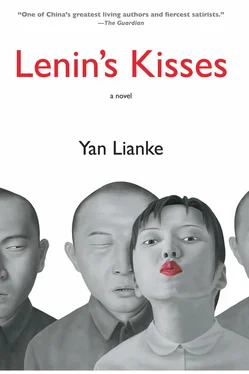As a result, Hu developed a deep and abiding hatred for the people of Hongdong. He subsequently made his way to the Balou mountain region in eastern Henan, and by the time he arrived he was famished, parched, and on the verge of collapse. He saw a thatched hut in a valley, and inside an old lady was preparing a simple meal of grain husks and bread made from wild weeds. Hu hesitated, but eventually decided not to ask her for anything. As he was about to leave, however, the old woman suddenly gestured for him to come in. She offered him a seat, gave him some water to wash his face, then cooked him a delicious meal. Afterward, Hu showered her with appreciation, but the old woman didn’t utter a single word in return. It turned out that, in addition to being as thin as a rail, she was also deaf and mute. Hu decided that Balou’s generosity was the precise inverse of Hongdong’s depravity, and became determined to express his gratitude to the former while seeking vengeance against the latter.
Hu eventually stopped begging for alms and joined troops under the direction of the future Ming emperor Zhu Yuanzhang. He bravely risked his life on the battlefield, cutting down his enemies like blades of grass, and in this way this former vagrant helped contribute to the establishment of the Ming dynasty. In the first year of the new dynasty, the new emperor surveyed the war-ravaged landscape, and cried out in anguish. The Central Plains region lay barren, its population decimated, with corpses piled high in mass graves.
One of the emperor’s first projects, therefore, was to organize a series of mass relocations to help repopulate these barren regions, and he appointed Hu Dahai to serve as his minister of migration. Using Shanxi’s densely populated Hongdong county as his base of operations, Hu proceeded to organize a mass migration from Shanxi to Henan. His primary target, however, was the family of the rich Hongdong man who had used a scallion pancake to wipe his grandson’s butt and then fed it to his dog, and Hu insisted that everyone in the man’s village — including even the blind and crippled — be forcibly relocated.
When Hu Dahai heard that the migration procession included an old blind man with his crippled son, not only was he unsympathetic; he was filled with vengeful rage. He refused to even consider allowing the two of them to drop out — leaving them with no choice but to continue trudging forward. When the procession was passing through Henan’s Balou mountains several months later, the blind man and his son collapsed, and sympathizers again petitioned Hu Dahai to permit them to remain behind. Just as Hu was about to grab a knife to kill the petitioners, he happened to notice the same deaf-mute woman who had cooked him a meal when he had wandered into the Balou region. He immediately threw down his blade and knelt before her.
Under the woman’s imploring gaze, Hu Dahai agreed to let the blind man and his crippled son stay behind. He left them with many taels of silver, and ordered a hundred soldiers to build them a house and help them cultivate several dozen mu of farmland, to be irrigated with water from the river. As Hu was about to leave, he told the deaf-mute woman, the blind father, and his crippled son:
The soil in this valley is rich, and the water abundant. I am leaving you with plenty of silver and grain, so that you may settle down to farm and to liven.
From that point on, this gorge came to be known as Liven Gorge. When word got out that a deaf-mute woman, a blind man, and a cripple had set up a household here and were enjoying a heavenly existence, disabled people from throughout the region began pouring in. The deaf-mute woman supplied them with land and silver, thereby permitting them to live comfortably, raise families, and establish a village. Although many of these villagers’ descendants inherited similar physical handicaps, the deaf-mute woman continued to provide them with everything they needed. The village came to be known as Liven, and the old woman was recognized as the ancestral mother.
This is merely a legend, but it is a legend that has become common knowledge.
On the other hand, a Shuanghuai county gazetteer reports that although Liven has existed since the Ming dynasty, its recorded history dates back only to the previous century. It claims that Liven was not merely a location where disabled residents established a community, but a sacred revolutionary site where a soldier by the name of Mao Zhi from the Red Army’s Fourth Regiment settled down to live.
In the fall of the bingzi year, 1936, General Zhang Guotao’s Fourth Regiment separated from the rest of the Red Army, and consequently at the end of the Long March they didn’t stop at Shaanxi with the rest of the army, but rather continued westward. Zhang was initially concerned that his injured troops would fall behind, but he subsequently began to fear that they would return to Yan’an and disclose his separation from the Red Army. He therefore ordered all of the injured troops to disband and return home. However, shortly after the soldiers tearfully bade farewell to the comrades with whom they had fought day and night, they were attacked by Nationalist forces and more than half of them were slaughtered, leaving the remainder with no choice but to remove their uniforms and continue toward their respective hometowns disguised as peasants.
This gazetteer reports that Mao Zhi was the youngest female soldier in the Red Army — noting that she was only eleven when she joined and fifteen when she left the Fourth Regiment. In the guihai year, 1923, when she was a year old, her father had been imprisoned and killed during Zhengzhou’s Great Railroad Strike, at which time her mother took her to join the revolutionary forces. After her mother was killed during the Fifth Encirclement Campaign, Mao Zhi became a revolutionary orphan who knew that her hometown was somewhere in Henan province, but wasn’t sure of the town or district. She subsequently joined the Fourth Regiment with her mother’s comrades, and together they embarked on the Long March. As the troops were crossing the snow-covered mountains, Mao Zhi lost three toes to frostbite and broke her leg falling into a ravine, leaving her unable to walk without the aid of a crutch.
Most of Zhang Guotao’s injured troops either died or simply disappeared after he ordered them to return home, but Mao Zhi managed to survive by hiding in an open grave. She subsequently lost contact with the army and had to resort to begging for alms. When she arrived at the Balou mountains and saw the disabled people living in Liven, she decided to stay with them. The gazetteer reports that while there was no record of Mao Zhi’s having officially joined the Red Army, everyone in Liven — and throughout the entire county — regarded her as a bona fide revolutionary leader. Thanks to her, therefore, Balou came to have glory, Liven came to have direction, and the villagers, despite being physically disabled, were able to live happy and fulfilled lives in the new society.
When this local gazetteer was revised and published in the gengshen Year of the Monkey, 1980, the section on Mao Zhi reported that she and the other villagers were content. In this way, the village of Liven truly lived up to its name.
7) Site. DIAL. Place, location. That site:That place, that location.
CHAPTER 3: THE VILLAGERS OF LIVEN BECOME BUSY AGAIN
Heavens! The snow fell continuously for seven days — seven long days that virtually killed off the sun.
These seven days of hot snow transformed summer into winter.
Once the snow finally began to taper off, some villagers tried to begin harvesting the wheat. Rather than using sickles, they lifted the wheat stalks out of the snow with their bare hands and snipped off the ears with scissors. They placed the wheat in a bag or basket, which they carried to the front of the field.
Читать дальше












